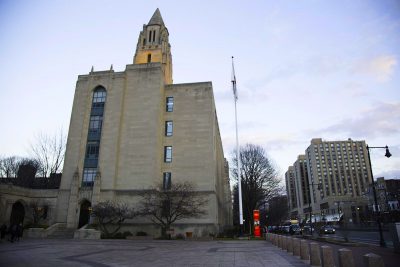After two years of preparation, Boston University’s Center for Innovation in Social Sciences is finally getting off the ground.

The CISS —an “intellectual home” at BU for students and faculty researching social sciences, according to its website — launched on Sept. 1, said Deborah Carr, professor of sociology and the inaugural director of the CISS.
Creating the center began with a task force back in 2019, Nazil Kibrea, the associate dean of the faculty for the social sciences in the College of Arts and Sciences, said. The task force went to different departments to see what was needed in order to create a plan for the center.
When writing the report of their findings, Kibrea said the task force saw “there was a sense of a gap in terms of a center, a place where people could come together” for research in social sciences.
“The aim is to really move social sciences at BU into a really leading place for social science work, research and teaching,” she said.
The center is currently in the process of hiring staff and developing different programs, Carr said. As of now, she said there are 34 faculty affiliates who will participate in different research groups in the CISS.
It will also have funding for six undergraduate research projects with topics ranging from crime to development, she said. Each selected student will be paid and paired up with a faculty member to create those research projects.
Dean of Arts and Sciences and Professor of computer science Stan Sclaroff said the CISS will be a “community hub” for social sciences across BU.
“I’m very much hoping to support students engaging in experiences that allow them to take their classroom learning and use it in pursuing social science research questions while they’re here,” Sclaroff said.
Sclaroff said the world is currently facing many challenges, including COVID-19, and in order to find a solution “you need to consider the social sciences angles.”
In having the CISS, Sclaroff said, “we’ll be able to identify what elevates the social sciences presence on campus.”
The first event of the center, an open house for faculty and students to learn more about the CISS, will be held on Thursday, Carr said.
“It’ll be kind of a show and tell of our partners and our goals,” Carr said, “then, most importantly, listening to the voices of our faculty members and graduate students and any students who come to this meeting to hear what are their hopes.”
The CISS has more workshops planned for the semester and plans to have the center completely running by February. They will be “rolling” the different programs, Carr said.
“By April, we will have kind of one full academic year where every kind of program has been introduced, and moving forward, we hope to kind of scale it up, meaning building it bigger so that more people can participate,” Carr said.
Carr said she is most excited about “providing an infrastructure so we really can build new multidisciplinary research projects that provide getting research opportunities for students.”
“Ideally these projects will focus on some of the cutting-edge problems that we have today, everything from health disparities to poverty to rising levels of income inequality,” she said.
To participate in the center, she said students should attend the events listed on their website and get in contact with her. The current application period is closed but she said there are other ways to get involved and she is updating the website every day.
“The end goal is to bring together researchers to do just top quality rigorous research that hopefully will provide opportunities to engage undergraduate and graduate students,” she said.



























































































































